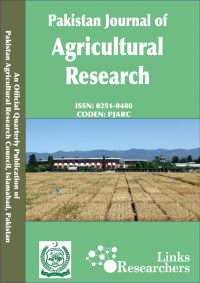Z. A. Soomro, M.B. Kumbhar, A.S. Larik*, M. Imran** and S.A. Brohi***
ABSTRACT
Heritability (b.s), genetic advance, phenotypic and genotypic variance for different quantitative traits is important in determining the effectiveness of selection. In this study the potential effectiveness of selection in parents and their F2 and F3 progenies of Gossypium hirsutum for plant height, sympodia/ plant, bolls/plant, boll weight, seed index and seed cotton yield/plant was determined. It was found that all the populations alongwith parents differed significantly (P < 0.01) and exhibited genetic variability among the genotypes for all the traits except sympodia/plant. Genetic parameters computed through variance components method show that all the traits were highly heritable in F2 and F3 generations except sympodia/plant, indicating quantitative pattern of inheritance, offering better chances of selection for these traits in F2 and F3 generations. The traits namely plant height, bolls/plant and seed cotton yield/plant displayed high heritability (72.97 - 75.55%) with remarkable genetic advance (112.46 - 357.01%) indicating that these traits were predominantly governed by additive gene effects and direct selection may be effective. Boll weight and seed index exhibited low genetic advances irrespective to their high heritability estimates, probably due to non-additive gene effects, developing transgressive segregants through hybridization is suggested. However, hybridization system, which exploits both fixable and non-fixable components, simultaneously, could be useful in the genetic improvement of yield and yield components in upland cotton.
To share on other social networks, click on any share button. What are these?







